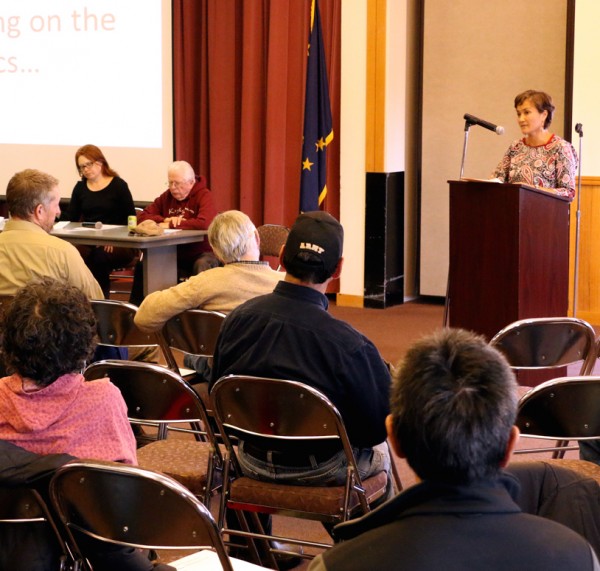
Bethel residents are urging the city to protest a package store license that’s before the state’s Alcoholic Beverage Control Board. The Bethel Native Corporation’s Bethel Spirits LLC application was officially filed Monday morning.
With a separate deadline of 90 days to act on BNC’s proposal, the director of the Alcoholic Beverage Control Board attended a community meeting in Bethel to bring people up to speed on the process. Director Cynthia Franklin, explained that the board by law must honor a hypothetical government’s protest of a license, unless it meets specific criteria.
“Is this protest arbitrary, capricious, and unreasonable? When people ask me what it means- is the city council picking on this application? That’s basically what it means in everyday language. Everyone would know arbitrary, capricious, and unreasonable if they saw it,” said Franklin.
The city hasn’t taken any action. Bethel is unique in that it’s wet but with no liquor stores or bars. Voters in 2009 went unrestricted and did away with local option laws limiting imports and prohibiting sales. The next year citizens rejected local sales in an advisory vote.
That 2010 vote weighed heavily with Deborah Sampson, one of dozens in the more than four hour meeting who testified against the idea of a liquor store.
“We overwhelmingly said we don’t want alcohol here. We don’t want it sold, we don’t want a distribution point, and I don’t think that status should change until we have another vote,” said Sampson.
And citizens could again go to the polls if the council chooses to sponsor a community vote. Mayor Rick Robb, who has spoken publicly in favor of local sales, says he will bring a proposal before council to have an advisory vote.
People from the villages around the lower Kuskokwim spoke up, mostly to oppose the store. The regional significance of Bethel as a hub was a theme throughout the night. Dan Winkelman, President and CEO of the Yukon Kuskokwim Health Corporation, cited research about the the effects of easier access to alcohol.
“It is not whether prohibition works or doesn’t work as some have said. But rather as these studies have concluded, the issue is more precisely that as alcohol availability increases, so do alcohol related injuries and death,” said Winkelman.
A handful of the nearly 50 speakers made the case for local sales. BNC President and CEO Ana Hoffman said the choice is not about whether to have liquor sales, but whether to have regulated sales or continue to support an underground bootlegging economy.
“It is time for the community to mature and no longer be crippled by paternalistic mentalities. We manage our lives in the most challenging of environments. We can handle a liquor store in Bethel and the area villages can handle it too. Let’s give ourselves a little credit. We are capable, sophisticated, adapting people,” said Hoffman.
The vast amounts of liquor being shipped in helped shape the perspective of Alan Evon from Kwethluk who worked at an air carrier.
“I used to offload 10,000 pounds of booze a day for Bethel and the bootleggers. We should stop the orders coming in, stop that artery of alcohol coming in, and just sell it at the liquor store,” said Evon.
A variation of what Evon describes would require a change in the local option status, and the idea that came up several times in the meeting. ABC Director Franklin says Bethel’s legal situation makes it difficult to regulate.
“As long as you’re in the wet status, you have no rules, so what I keep trying to let people know, when people stand up and say ‘we can’t let the alcohol come here,’ you’re fooling yourself. The alcohol is here. You’re wet. Wet, wet, wet. You’ve got a lot of alcohol here, and you have no rules that are enforceable,” said Franklin.
Franklin added that with Bethel’s current adjusted population of just under 6,000 people, the law would allow for two package stores, two bars, and four restaurants, plus a few specialty licenses.
The timing for the current licenses is in flux. Currently none of the scheduled ABC board meetings this spring and summer meet both 60 day and 90 day requirements. There is a possibility of more meetings. The board can hold a public hearing related to objections to the license, which can be filed in writing by individuals.
Ben Matheson is a contributor with the Alaska Public Radio Network.




